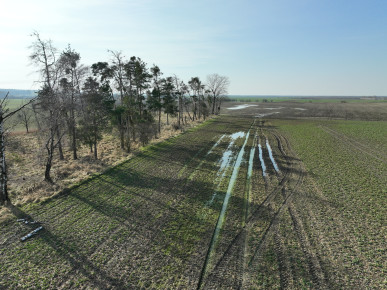Constant water shortages in South West Ethiopia – “When we accessed clean water; it was like a miracle.”
Published: Feb 27, 2023 Reading time: 3 minutes Share: Share an articleClean water is sacred in Konso and other parts of South West Ethiopia. People in Need has constructed wells for more than 7,000 people. New water points save time and protect health.
Apart from acute water shortage, repeated social unrest in the area makes life even more challenging for the locals. People migrate from village to village, searching for safety and basic needs. To provide access to clean water, People in Need (PIN), in its emergency program, funded by the Bureau of Humanitarian Assistance of the United States Agency for International Aid (BHA), carried out the construction of shallow wells in three kebeles— Turuba, Guma, and Kulango—and Ale Special Woreda. In total, 7,279 people now have access to clean water and benefit from the project.
Aynalem Gadisa lives in Turuba kebele. She is a farmer and a mother of three children. She indicated that before the water point construction, people used to fetch water from the seasonal rivers or ponds. Consequently, water-related disease—such as diarrhoea—was quite common in her village.
Water shortages not only cause diseases but also causes villagers a lot of their time. In the dry season, they must walk for two hours to fetch water from nearby sources. Besides, the water could dry up, and they must dig the sand to get to it. According to Aynalem, such exacting work used to take much of her time daily in the dry season, leaving her little time to manage her household work.
Accessible drinking water: A persistent problem in Ethiopia
Galeto Gaffena is another resident of Turuba kebele. He admits that the water problem in his kebele has been chronic. Families—usually women—have to walk more than 4 km every day to fetch water from a nearby river. The water collected was often too little to fulfil human needs and was often critically polluted. Each month an average of 15 to 20 people from his village contract waterborne disease.
A few months ago, PIN built a water point in the area, and around 2,400 villagers now have access to a clean water supply.
With the help of PIN, the community established a water committee to ensure sustainable water provision. Galeto is its Chair Person, and like all members, he has taken basic skills training on financial management and maintenance. “Every household contributes 10 birr
(€ 0,17) every month. Our savings reached around 15,000 birr (€ 260). We use the money to maintain the water points,” he added. As a committee chairperson, he often discusses issues related to water points, takes feedback, and makes decisions. The water point has led to tremendous positive changes in the village.


